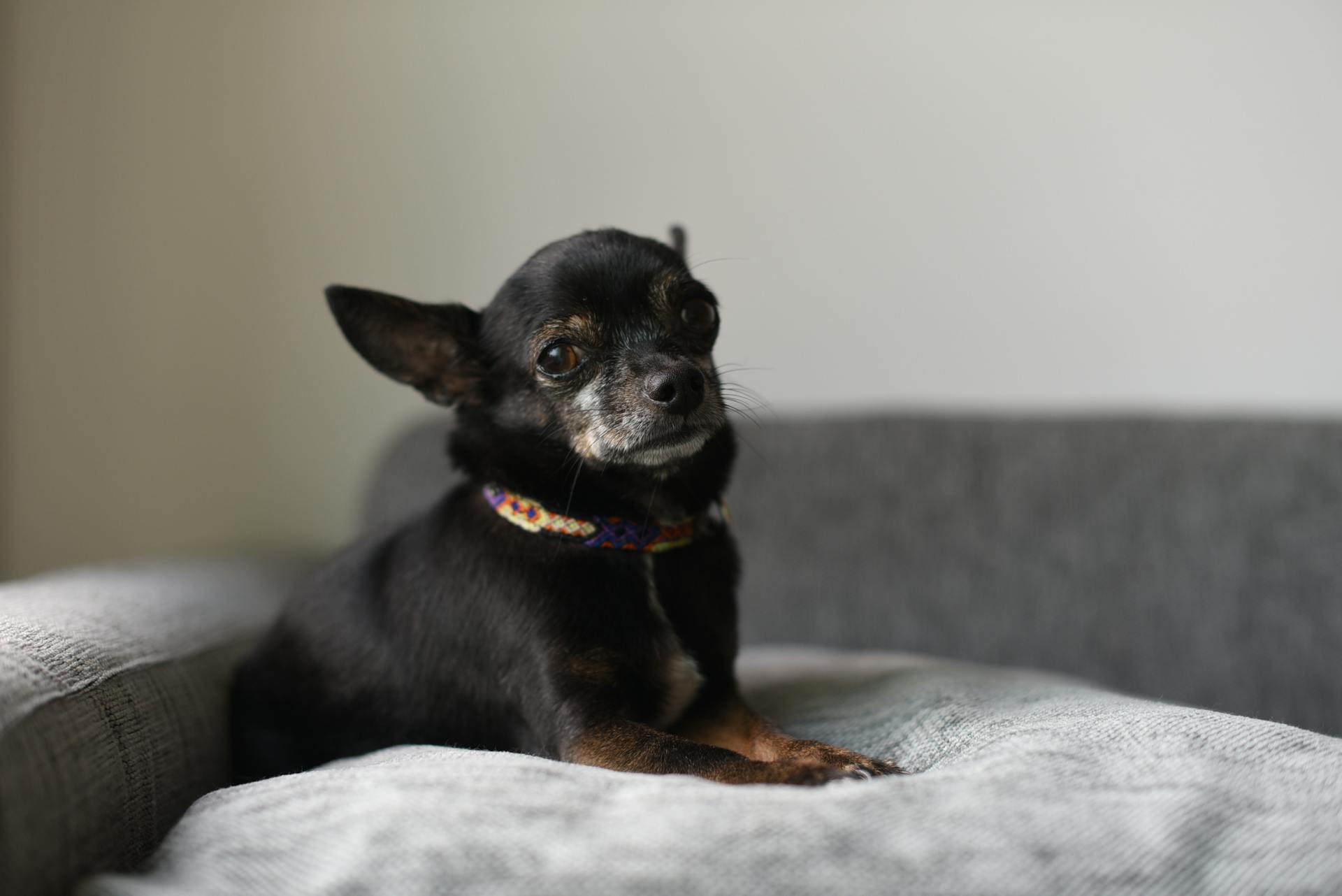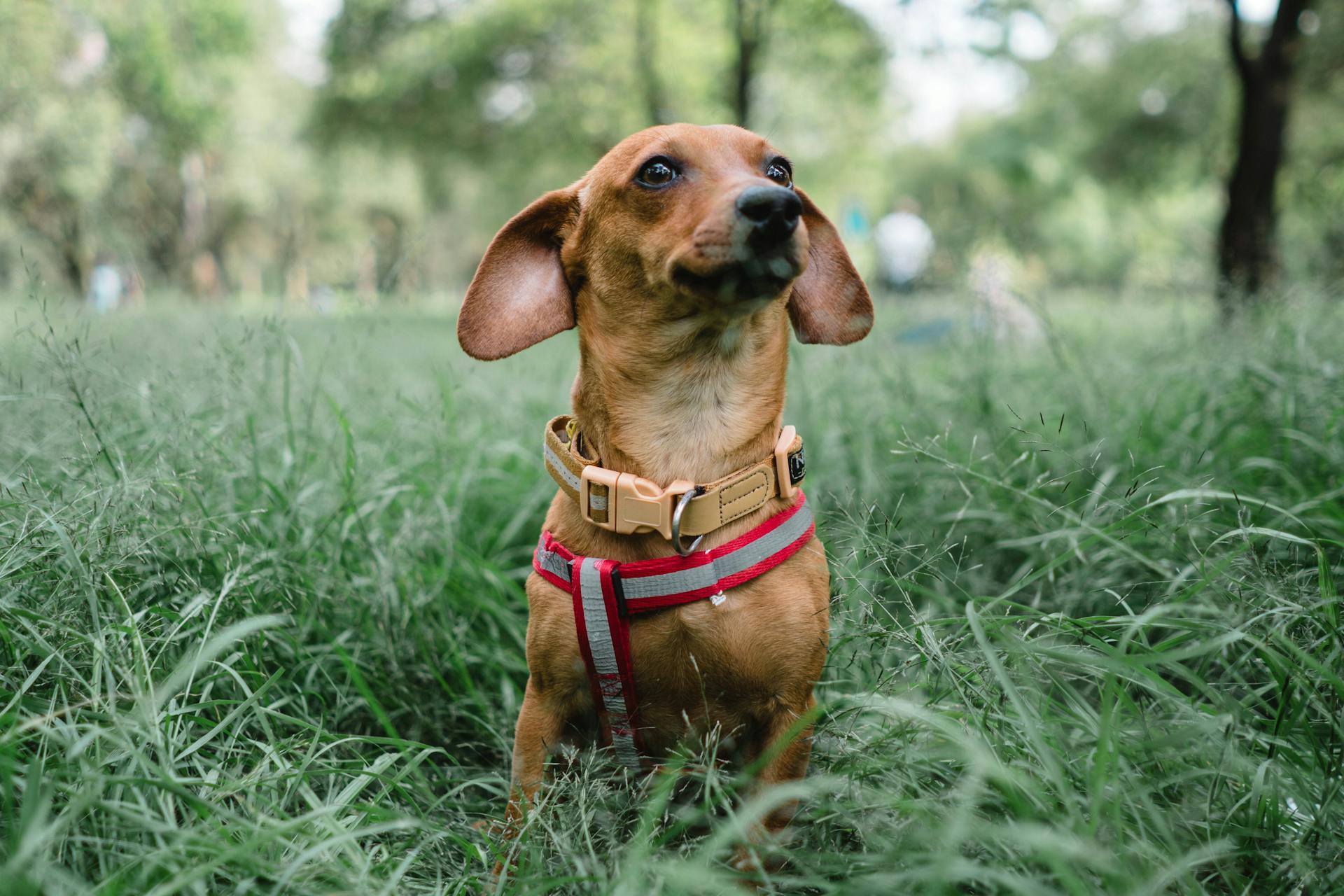
Chihuahuas can be quite aggressive, and it's essential to understand why. This is partly due to their history as guard dogs in Mexico, where they were bred to be fiercely protective of their owners and territory.
Their small size may make them seem harmless, but they have a big attitude. In fact, Chihuahuas have been known to be more aggressive than larger breeds.
Their breeding history also involves being wary of strangers, which can lead to defensiveness and aggression. This wariness is a natural response to potential threats, but it can be misinterpreted as aggression.
Their intelligence and loyalty also contribute to their strong protective instincts, making them even more likely to defend their family and territory.
For your interest: Are Chihuahuas Protective
Causes of Aggression
Aggressive traits in Chihuahuas can be due to a lack of socialization. They get so attached to their humans that they don't socialize much with other people or dogs.
Attachment issues can cause them to be more fearful or uncomfortable with other people, leading to aggressive behavior. This can manifest as growling, snapping, barking excessively, a curled up lip, bared teeth, stiff body, and raised hair on their back.
For more insights, see: Why Do People like Chihuahuas
Social development for a Chihuahua is most crucial in the first seven weeks of their life. Exposing them to more people and other pets during this time may help to curb their aggression toward others when they are older.
Options for socializing your Chihuahua include playdates with other dogs, park walks, pet stores or other pet-friendly stores and restaurants, and puppy classes.
Signs of Aggression
Chihuahuas may be tiny, but their aggressive behavior should not be taken lightly. Growling or barking at people or other pets, especially when they're near their food bowl, is a common sign of aggression.
A stiffening up or raising the hackles can also indicate aggression in Chihuahuas. Eye contact is another way to tell if a Chihuahua may become aggressive – if they're fixated on something or someone, it could be a sign of an impending attack.
Positive reinforcement training with a professional trainer is essential to ensure your Chihuahua remains happy and healthy. Rewarding good behavior with treats will be more effective than punishing bad behavior.
A Chihuahua's stiff body posture can let you know a lot about their temperament.
Managing Aggression
Chihuahuas can be aggressive due to fear or anxiety, which can be addressed by slowly desensitizing them to new people and situations in a calm environment.
Proper socialization during their formative stages is crucial to help them learn that people are not a threat and can begin to trust them.
Giving your Chihuahua plenty of physical activity to help release any pent-up energy that could make them more irritable is also essential.
Rewarding good behavior with treats or praise can create positive associations with people for your Chihuahua and help them stay calm when around others.
Providing plenty of playtime and exercise each day can help reduce stress and release excess energy that can lead to aggressive outbursts, making your Chihuahua a happier and more well-behaved companion.
Managing Aggression
Managing Aggression in Chihuahuas requires patience and consistency.
Chihuahuas can be prone to aggression due to a lack of socialization, which can lead to fear and anxiety. This is especially true if they don't socialize with other people and dogs from an early age.
Proper socialization during the first seven weeks of life is crucial for Chihuahuas. Exposing them to more people and other pets during this time can help curb aggression later on.
Reward-based training can help manage territorial behavior or feeling threatened. This type of training focuses on praising desirable behaviors rather than punishing negative ones.
Managing aggression takes time and patience. Consistency is key, so be sure to stick to a training plan and provide plenty of playtime and exercise each day to reduce stress and release excess energy.
Desensitizing your Chihuahua to new people and situations in a calm environment can help if aggression is due to fear or anxiety. This can be done slowly and carefully to avoid overwhelming your pup.
Suggestion: Are Chihuahuas Good for First Time Owners
Territorial Protection
Chihuahuas are tiny, but they pack a punch when it comes to defending their territory. They can be aggressive with people who invade their space.
Their ancestors come from Mexico, where people used them for protection and hunting small game animals like rabbits. This history of protection and hunting has made them naturally territorial.
Chihuahuas may stiffen up or raise their hackles when they feel someone is invading their space. This is a clear sign of aggression and should not be taken lightly.
If your Chihuahua is snapping at visitors or barking at other dogs, it may be due to territorial behavior. In this case, positive reinforcement methods like reward-based training can be effective in managing their aggression.
Providing plenty of playtime and exercise each day can also help to reduce stress and release excess energy that can lead to aggressive outbursts.
Training and Socialization
Training and socialization are key to reducing aggression in Chihuahuas. Consistent training and socialization can help minimize outbursts of aggression.
Chihuahuas can be aggressive due to lack of socialization, separation anxiety, and territorial behavior. Proper socialization is crucial in the first seven weeks of their life, and exposing them to more people and other pets during this time may help curb their aggression.
Worth a look: Crate Training Anxious Dog
Socialization can be achieved through playdates with other dogs, park walks, pet stores or other pet-friendly stores and restaurants, and puppy classes. Positive reinforcement and treat rewards work better in training your Chihuahua than scolding and punishments.
Chihuahuas are intelligent and can be trained with gentleness, patience, and kindness. They are very finicky eaters and may ignore treats as an incentive to do anything.
Here are some effective ways to train your Chihuahua:
- Use positive reinforcement techniques like treats or verbal praise
- Be conscious of warning signs like growling or baring teeth
- Gradually and slowly introduce new situations and people
- Provide plenty of physical activity to release pent-up energy
- Focus on praising desirable behaviors rather than punishing negative ones
Remember, managing your Chihuahua's aggression takes time and patience. Be consistent with training and you'll see improvements in your pup's temperament.
Understanding Chihuahua Behavior
Chihuahuas are naturally feisty and confident, which can sometimes be misinterpreted as aggression. They bark loudly when encountering other animals or people, and their small size makes them prone to injury.
Their stubbornness can make training challenging, and they require a firm but gentle approach to establish boundaries. If not trained correctly, they can become too assertive and even aggressive.
It's essential to be mindful of their fragile nature, especially around young children, as they can easily get injured with rough play. Leaving children alone with a Chihuahua is not recommended, as they might get nipped or bitten.
On a similar theme: What Not to Feed Chihuahuas
Personality
Chihuahuas are known for their feisty nature, which can sometimes get them into trouble.
They never back down from a fight, even when encountering a larger, aggressive dog. This means you need to establish clear rules and boundaries to avoid conflicts.
Chihuahuas are confident in their size and bark loudly when encountering other animals or people, which can be intimidating to some.
Their small size and fragile nature make them prone to injury, especially around younger children who may not understand how to handle them gently.
You need to be extremely careful with a Chihuahua around young children, as they could be easily snapped at, nipped at, or bitten if left alone together.
Chihuahuas can easily be injured with rough play, so it's essential to supervise interactions between children and your Chihuahua.
Their stubbornness makes it difficult for them to be trained or corrected by humans, so consistency and patience are key.
See what others are reading: Do Chihuahuas Get Cold Easy
If your Chihuahua is timid around other dogs, giving them more distance and working on meeting friendly dogs off-leash can help reduce aggression.
However, some Chihuahuas can be too confident and feisty, and may initiate an attack against another dog, even if they're smaller.
Don't ever allow your Chihuahua to run off-leash, as this can lead to serious confrontations with other dogs.
Recommended read: Leash Aggression Dog
Health Problems
Chihuahua health problems can be a major contributor to their behavior. Dental problems can be a significant issue, especially if not properly cared for.
Intestinal parasites can cause a range of symptoms, from diarrhea to weight loss. Heartworms can also be a serious problem, especially if left untreated.
A Chihuahua's small size can make them more susceptible to these health issues. Regular veterinary check-ups can help identify any potential problems early on.
A fresh viewpoint: Health Issues for Chihuahuas
Frequently Asked Questions
What's the most aggressive dog?
While none of the listed breeds are inherently aggressive, the American pit bull terrier has a lower passing percentage of 52.9% on the American Temperament Test Society, indicating a higher potential for aggression. However, it's essential to note that individual temperament can vary greatly within breeds.
Sources
- https://content.tailster.com/chihuahuas-so-aggressive-expert-tips-to-control-it/
- https://johnnyholland.org/2022/01/why-are-chihuahuas-so-aggressive/
- https://www.barkbusters.com/breed-of-the-month/chihuahua/
- https://www.chihuahuapuppytraining.com/chihuahua-aggression-toward-other-dogs/
- https://www.greenmatters.com/pets/why-are-chihuahuas-so-aggressive
Featured Images: pexels.com


